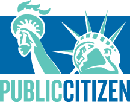 Public Citizen Testifies Before the U.S. Senate Committee on Veterans’ Affairs, Explains How to Reduce Cost of Therapies
Public Citizen Testifies Before the U.S. Senate Committee on Veterans’ Affairs, Explains How to Reduce Cost of Therapies
[Public Citizen Press Release, Link] The federal government should act to dramatically lower the cost of new and prohibitively pricey medications to treat hepatitis C (HCV), Public Citizen President Robert Weissman told U.S. Senate lawmakers today (PDF).
Weissman testified before the U.S. Senate Committee on Veterans’ Affairs, explaining how the extraordinary cost of new treatments, including Gilead’s antiviral Sovaldi (sofosbuvir), is leading to rationing.
“The present approach whereby we are at the mercy of Gilead’s monopoly control over sofosbuvir – a government-granted monopoly, at that – is morally unacceptable, because it requires the needless rationing of an important medical therapy,” he said.
“Addressing the Sovaldi pricing problem – and avoiding both unjustified drain on the pocketbooks and treasuries of consumers and private and government insurers, and needless rationing of this apparently important medicine – will require a government licensing or acquisition arrangement.”
Hepatitis C is a serious liver disease that has infected an estimated 3.2 million people in the U.S. and takes about 15,000 lives annually in the United States. Infection rates with the hepatitis C virus are far higher among veterans than the general public – as much as five times higher – making hepatitis C treatment a priority matter for the Department of Veterans Affairs.
Over the past year, new treatments for HCV have become available and through clinical trials the treatment appears to offer much higher cure rates – up to 95 percent – than previously existing therapies, with far less severe side effects. But these new medications are extraordinarily expensive – Gilead is charging $1,000 a pill, or $84,000 for a 12-week course of treatment of Sovaldi.
“It’s a great thing that our public and private medical research system is able to develop important new treatments,” said Weissman. “For patients, however, those treatments are useful only if they are accessible, and we’ve now reached a point where treatments will increasingly be restricted and rationed because brand-name companies have used monopolies to price them out of reach. We have to do better, and we can.”
In his testimony, Weissman stated that manufacturers are price-gouging because they have government-granted monopolies over the patents for the medications. But the high prices are imposing unsustainable costs on consumers, insurers and taxpayers, and as a result, public and private insurers are moving to ration HCV treatment.
“The deference to Gilead’s monopoly pricing for sofosbuvir is fiscally unsustainable,” Weissman said. “Sky-high prices for medicines with smaller patient populations are unacceptable, but the health care system can more easily absorb them. Gilead’s pricing for a product needed by a large patient population is already imposing serious strains on both public and private insurers.”
One solution, Weissman said, is for the government to apply a law that permits it to use patented inventions if it pays reasonable compensation to the patent owner. The federal government, then, would authorize generic manufacturers to make and sell the product for its use – in this case, for distribution to patients under its care.
The scope of the government use could vary. It could treat with generic versions hepatitis C patients served only by a particular agency – the Department of Veterans Affairs, for example. It could cover all government programs, including Medicaid and Medicare. Or, it could create a new program to cover all Americans.
With the ability to negotiate purchases from generic makers anywhere in the world that satisfy quality considerations, the government likely could obtain a course of a treatment at a cost of several hundred dollars per patient, Weissman explained. (A significant, additional expense would be incurred in paying royalties to Gilead, but overall costs would remain a tiny fraction of current prices.) With these reduced prices, treatment could easily be provided to all.
Alternately, the government could simply buy the patents from Gilead, Weissman said, making treatment available to all for the same amount of money (or potentially less) than what will otherwise be spent to make treatment available on a rationed basis.
Weissman noted that the problems posed by the new hepatitis C treatments are endemic to the pharmaceutical sector, and he urged consideration of new approaches for paying for treatments for other high-cost therapies as well.
“We need to find different ways to reward innovators for research and development other than with patent monopolies and marketing exclusivities,” Weissman said. “Research and development does have real costs, and it is important that it be both supported and incentivized. But monopolies have proven an enormously inefficient way to do so, and now are increasingly being deployed in an unsustainable fashion.”




